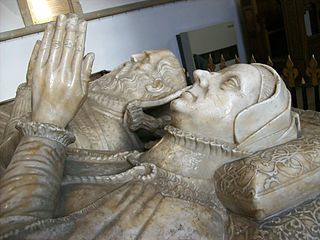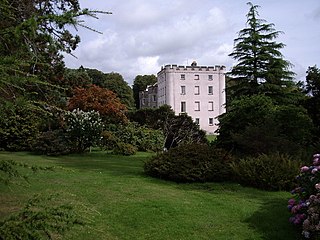Related Research Articles
This article contains information about the literary events and publications of 1614.

Cuthbert Tunstall was an English Scholastic, church leader, diplomat, administrator and royal adviser. He served as Prince-Bishop of Durham during the reigns of Henry VIII, Edward VI, Mary I and Elizabeth I.
There has been a Lord Lieutenant of Buckinghamshire almost continuously since the position was created by King Henry VIII in 1535. The only exception to this was the English Civil War and English Interregnum between 1643 and 1660 when there was no king to support the Lieutenancy. The following list consists of all known holders of the position: earlier records have been lost and so a complete list is not possible. Since 1702, all Lord Lieutenants have also been Custos Rotulorum of Buckinghamshire.
The Amicable Grant was a tax imposed on England in 1525 by the Lord Chancellor Thomas Wolsey. Called at the time "a benevolence", it was essentially a forced loan, a levy of between one sixth and one tenth on the goods of the laity and on one-third of the goods of the clergy. The Amicable Grant should have been levied with Parliamentary authority, but was not, and so the legal framework for its collection was extremely weak. This was partly because it was brought to Parliament by Thomas Wolsey, who was becoming increasingly unpopular. Widespread passive resistance, with a growing threat of armed resistance, meant little money was raised and the project was dropped. King Henry VIII now lacked funds for his war in France and made peace.
The Abbot of Glenluce was the head of the monastic community of Glenluce Abbey, Galloway. The monastery was founded in 1192 by monks from Dundrennan Abbey with the patronage of Lochlann (Roland), Lord of Galloway. In the 16th century the monastery increasingly came under the control of secular warlords. In 1560 the monastery was occupied by James Gordon of Lochinvar, and the monks were expelled. However, soon after, Thomas Hay, a follower of the earl of Cassillis, was installed in the monastery as commendator and the monks were allowed to return. However, monastic life seems to have disappeared by the end of the century. In 1602 parliament granted the lands of the monastery to Lawrence Gordon as a secular lordship. The abbey was finally given to the bishop of Galloway in 1619. The following is a list of abbots and abbot-commendators:
Richard Fletcher may refer to:

John Williams, 1st Baron Williams of Thame was Master of the Jewels and Lord President of the Council of the Welsh Marches. He was summoned to parliament as Lord Williams of Thame on 17 February 1554.
John Fletcher may refer to:

Sir John Philipps, 1st Baronet was a Welsh landowner and politician who sat in the House of Commons in 1601.
John Abyn, of Salisbury, Wiltshire, was an English politician.
John Ainsworth, of Pershore and Worcester, was an English politician.
Sir John Raynsford was an English politician.
James Warnecombe or Warmecombe, of Ivington, Herefordshire, was an English politician.
Thomas Cheseman or Baker was an English politician.
John Fletcher was an English politician.
The Archdeacon of Brecon is a senior ecclesiastical officer in the Church in Wales Diocese of Swansea and Brecon. The archdeacon is the senior priest with responsibility over the area of the archdeaconry of Brecon, which comprises the five rural deaneries of Brecon, Builth, Crickhowell, Hay and Maelienydd.
Richard Hodges was an English politician.

Reginald Mohun or Mone, of Hall in the parish of Lanteglos-by-Fowey and of Bodinnick, both in Cornwall, was an English politician.
David Evans or Yeuans, of The Great House, Neath, Glamorgan, was a Welsh politician.
References
- ↑ "FLETCHER, Richard (by 1523-59/60), of Rye, Suss. - History of Parliament Online". www.historyofparliamentonline.org.
| This article about a 16th-century Member of the Parliament of England is a stub. You can help Wikipedia by expanding it. |